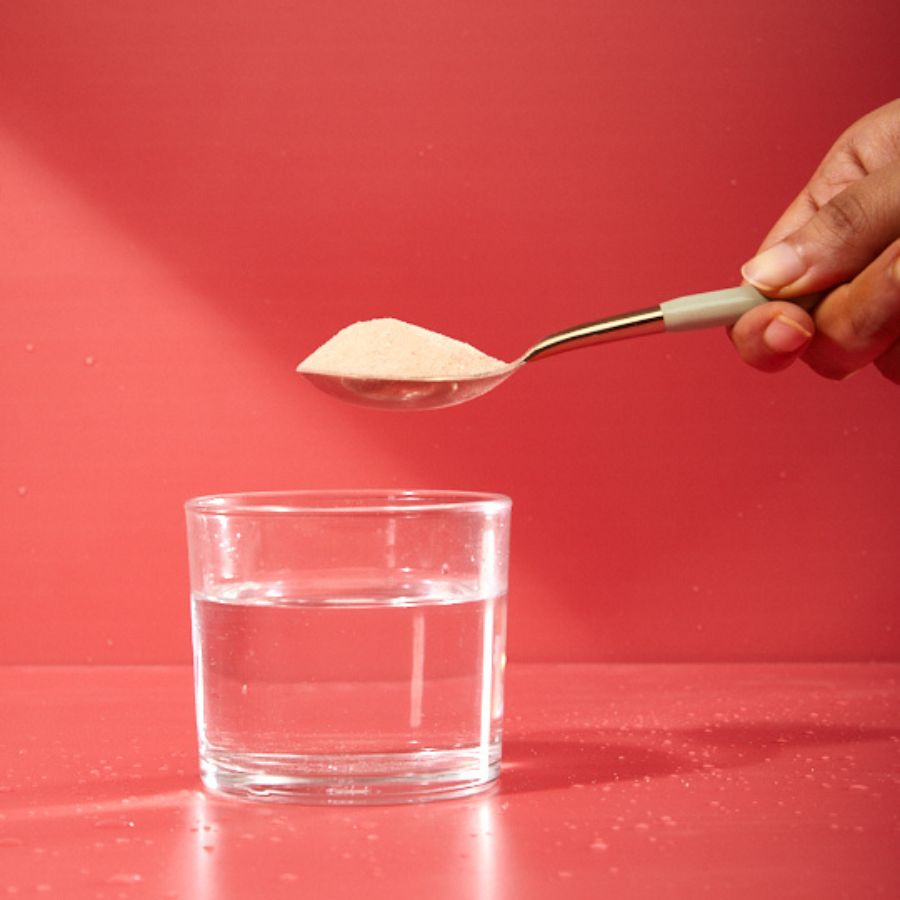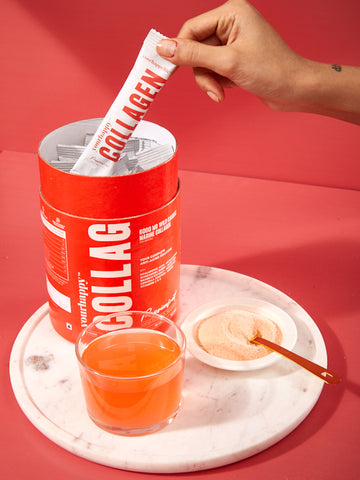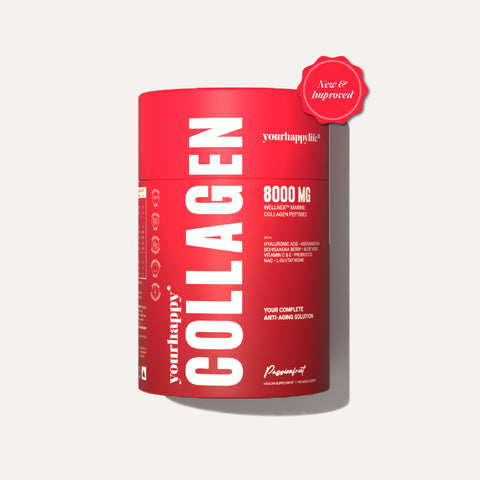News
Protein Deficit? It Might Be Collagen!

Our skin, bones, tendons, and other connective tissues depend on collagen, a protein found in the body. A protein deficiency in the body can lead to various health difficulties, and a collagen deficiency, in particular, can result in skin and joint issues.
A collagen deficiency can cause the skin to lose its suppleness and firmness, resulting in wrinkles and fine lines. In addition, a collagen deficiency can cause brittle and fragile bones and joint pain and stiffness due to decreased cartilage in the joints.
What Is Collagen Protein?

Collagen is a type of protein that is an important structural component of many tissues in the body, including the skin, bones, tendons, and cartilage. It is the most abundant protein in the human body, making up about 30% of total protein content.
Collagen provides strength and elasticity to these tissues, helping to maintain their shape and function. It is made up of amino acids, primarily glycine, proline, and hydroxyproline, which are arranged in a unique triple helix structure.
In the human body, collagen molecules make up:
- 30 percent of all protein in the human body
- 65-80 percent of the proteins in a ligament
- 70 percent of the proteins in a tendon
- 60 percent of the proteins in bones
Collagen protein supplements are derived from animal collagen. Yes, that does mean that there are NO vegan collagen options. Most companies source their collagen from the hides and connective tissues of cows. These contain copious amounts of high-quality collagen and also support sustainable farming practices by ensuring farmers can use all of the cows.
Also Read: 6 Collagen Rich Foods in India
Protein Vs Collagen
A protein deficiency or collagen deficiency can develop when these essential nutrients are insufficiently supplied to the body. For example, a diet low can cause a protein deficiency in protein or certain amino acids. However, collagen deficiency can be caused by aging, certain health disorders, and lifestyle factors such as smoking and excessive sun exposure.
Symptoms of a protein deficit can include.
- Brittle nails and hair
- loss of muscular mass
- Poor immune function
- Slow wound healing
- Weakness and fatigue
Symptoms of a collagen deficiency can include.
- Brittle nails & hair
- Wrinkles and fine lines
- Decreased skin elasticity
- Joint pain and stiffness
- Sagging skin
Also Read: Impact of Collagen Drink on Your Skin
Several Similarities Exist Between Collagen And Protein
- Both are macronutrients: Protein and collagen are essential macronutrients the body needs in large amounts. They have diverse roles, yet both are essential for maintaining general health and well-being.
- Both are made of amino acids: Collagen is a form of protein, and like other proteins, it is composed of smaller units known as amino acids. These strands of amino acids are folded into various shapes to carry out various biological processes.
- Both are involved in tissue maintenance and repair: Collagen is an essential component of connective tissues, such as skin, bones, tendons, and cartilage, and is necessary for maintaining their structure and integrity. Other proteins have a role in the construction and repair of tissues throughout the body.
Also Read: Why Your Exercise Routine Should Include Collagen
Signs Of Protein Or Collagen Deficiency
- Fragile, brittle bones that are more prone to fractures
- Joint discomfort and stiffness
- Poor skin health, including wrinkles, fine lines, and thin, dry, and dull skin
- Reduced muscular mass and decreased mobility
- Slow wound healing
- Weak and brittle nails
Causes Of A Deficiency In Collagen Or Protein
- Poor nutrition: A collagen powder or protein powder deficiency can result from a diet deficient in protein or certain amino acids.
- Aging: Our bodies produce less collagen as we age, which can negatively impact skin elasticity and joint health.
- Medical conditions: Certain disorders, such as liver or kidney disease, might hinder the body's capacity to make or utilize collagen and other proteins.
- Smoking and excessive sun exposure: Smoking and overexposure to the sun can damage collagen and other proteins, deteriorating skin and joint health.
- Chronic stress: Chronic stress can break down collagen and other proteins, deteriorating skin and joint health.
Also Read: The Ultimate Guide To Marine Collagen: What You Need To Know
Why Collagen Deficit And Protein Deficiency Are Linked?

Many people worldwide, particularly in developing countries, suffer from protein-energy malnutrition, a lack of protein in the diet. This can result in various health issues, including stunted growth, a weakened immune system, and a decline in muscle mass.
-
Missing certain Amino Acid
Protein insufficiency can lead to collagen deficiency since collagen is a type of protein that requires synthesizing particular amino acids. If these amino acids are insufficient, the body cannot make enough collagen to support the skin, bones, joints, and other connective tissues.
Collagen is composed of three essential amino acids. hydroxyproline, proline, and glycine. These amino acids are necessary for collagen formation and must be received through food. If the body does not receive sufficient amounts of these amino acids, it cannot generate enough collagen to maintain the structure and integrity of connective tissues. Moreover, a lack of protein in the diet might reduce overall health, affecting collagen production. For example, a protein-deficient diet can decrease muscle mass, weaken joints, and increase injury risk.
Protein-deficient diets can weaken the immune system and impair wound healing, affecting skin health and collagen formation due to missing certain amino acids. As a result, people may have collagen deficiency and its associated symptoms, such as sagging skin and joint pain.
-
Protein Derived Plant-Based Diets
The development of plant-based diets has boosted interest in alternate protein and collagen sources. Individuals following a plant-based diet, for example, may be concerned about a protein deficiency leading to a collagen deficiency since plant-based protein sources may not include all of the essential amino acids required for collagen synthesis.
People who follow a vegetarian or vegan diet may need to increase their intake of plant-based supplements or fortified foods that include certain amino acids to maintain adequate collagen synthesis.
Also Read: The Benefits Of Marine Collagen And How It Will Change Your Life
The Takeaway

YourHappy Collagen (Advanced 2.0)
Key Benefits
- Youthful, Smooth & Supple Skin
- Reduced Wrinkles and Fine Lines
- Increased Firmness & Elasticity
- Deeply Hydrated Skin, For a Rested & Refreshed look
Maintaining a well-balanced diet rich in protein and other necessary nutrients is critical for collagen, protein synthesis, and overall health. Consuming sufficient protein, particularly collagen-specific amino acids, and adding other nutrient-rich foods helps enhance collagen synthesis and promote skin health.
To maintain optimal health, it is recommended that individuals pay close attention to the amounts of protein and collagen they consume, both naturally and through supplements. Healthy skin can also be supported by skincare products containing collagen-boosting ingredients like vitamins C and E. Buy YourHappy Collagen supplement to obtain these collagen-enhancing ingredients.
Consult a medical expert for individualized guidance if you have specific health concerns or may have a collagen or protein deficiency.
Also Read: Why You Should Mix Collagen With Protein Powder
FAQ
How similar is collagen to a protein?
Collagen is a protein. However, it is not a "complete" protein, which can lead to some misconceptions. A complete protein has all of the necessary amino acids. Nine of the 20 possible amino acids are essential and cannot be made by the body.
Which is superior: Collagen or Protein?
Protein or collagen powder depends on your fitness and health goals. Collagen powder is an excellent choice if you're looking for a dietary supplement to help you feel and look better. However, protein powder is ideal if your goals are specific, like building muscle while doing intense exercise.
Read More Articles Collections:
Collagen + Skincare | Benefits Of Marine Collagen | Collagen-Boost Drinks | Do Collagen And Protein Powder Differ? | Ultimate Guide To Marine Collagen | 10 Reasons To Use Collagen | Age Groups And The Consumption Of Collagen | Collagen Supplements |





































